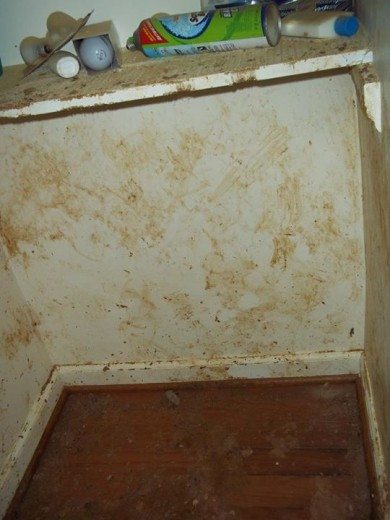⋅The Lowdown on Rat Infestation⋅
In a previous blog, “Rats, Feces and Oder – Taking Green to the Extreme“, we discussed how quickly and easily rodents can infest and destroy your home and how dangerous their presence in your home can be. In this blog, we’ll give you some tips about how to recognize the presence of rodents in your home and how to discourage rodents from entering your home.
Rats and other rodents carry deadly diseases that can be transmitted to humans through contact with their feces and urine, which they generously distribute throughout an infested home.
Not only do their waste products carry disease; they emit an unbearable, horrible stench.
Rats also will bite a pet or human who threatens them, an unpleasant and dangerous experience to say the least, and a good way to get rabies and other deadly diseases.
According to the Humane Society of the United States, more than 15,000 rat bites are reported every year in this country.
The destruction they cause to your home, gardens, and lawn can be devastating. They chew through walls, appliance hoses and wires, electrical wiring, floors, and furniture. And they multiply quickly. Even after a pest-control company gets rid of them, their young, who left the nest, will return to their birth place and bear their own young. It becomes an expensive, dangerous, and never-ending cycle.
Know What to Look For
Here are a few things that should alert you to seek immediate help from a professional exterminator:
- Droppings – Rat feces are most often found in kitchens, pantries, cupboards, along walls, and behind appliances. They look like black grains of rice and vary in size depending on the size of the rodent.
- Urine – Rodents have weak bladders and leave urine everywhere. Mostly, you will find it on the trails they commonly use to travel between food sources and their nest; often, this trail is behind appliances, through kitchen cabinets, and inside walls through which they have gnawed a hole, or have found a small existing crack, into your home. The smell is extremely unpleasant.
- Noise – You will hear squeaks, scratching, and rustling sounds in walls and attics. Rodents are active at night, so this is when you’ll most likely hear them.
- Gnaw Marks – Rodents gnaw constantly to wear down their incisor teeth, which never stop growing. You will see gnaw marks in wood baseboards, cupboards, window frames, door frames, furniture, and electrical wire.
- Nibble Marks and Holes in Food Packaging and Soap – If rodents can smell it, they will nibble at it. Rats especially love dry dog food. Rodents will nibble at boxes and bags containing rice, beans, pasta, grains, and even soap. Most of the time, you will also see rat feces in the area.
- Nests – Rodents build nests in warm, cozy places like boxes, cabinets, closets, attics, and walls, and they use fuzzy materials like insulation, fabric, and stuffing in furniture and stuffed animals.
- Pets Alerting – Cats and dogs alerting, acting excited, or showing an interest in a particular area of your house is a clue that rodents might be present.
How to Avoid a Rat Problem
By the time you are aware of a rodent problem, you are probably infested. By the time you see one rodent, there are dozens or even hundreds that you don’t see. If you see a rodent during the day, that’s a serious red flag suggesting that you probably have a big infestation because rodents rarely appear during the day. They are nocturnal. Your best defense, therefore, is to prevent rodents from entering your home to begin with. Here are a few tips:
- Keep bird feeders inaccessible to rats: on poles and away from your home.
- Keep firewood away from your home and stack it 18 inches off the ground.
- Close garbage-can lids and keep cans clean and away from your home.
- Do not compost any animal products. Keep compost lids tight, and use rodent-resistant composters.
- If you keep bird food, grass seed, or pet food in a basement, keep it in closed containers that rats can’t chew through.
- Seal all openings to your house. Rats can enter your home through tiny cracks and holes.
- Don’t leave uneaten pet food outside.
- Clean up pet droppings daily.
- Because roof rats enter your home from tree branches that hang over your roof, prune branches back and seal any openings in the eaves.
If an infestation does occur on a property you own or occupy, please let us clean and decontaminate your home for you.
If you have questions about decontaminating a scene that contains feces, urine, blood or other bodily fluids, about your payment options, or about what your current insurance policy covers, please don’t hesitate to give Advanced Bio Treatment a call at 800-295-1684.
Related Reading:



